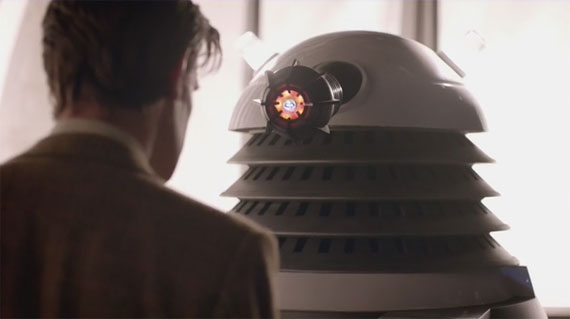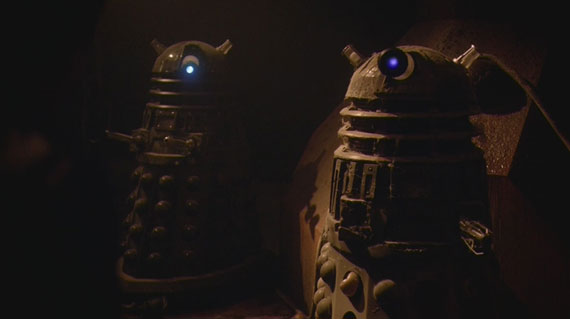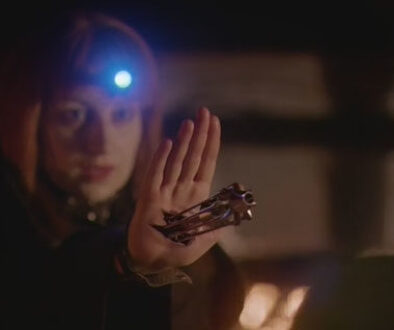2nd Opinion: Asylum of the Daleks

John Hussey and Adam James Cuthbert each give their own take on the Series 7 opener.
John’s Verdict
After waiting for just over 8 months for the new series of Doctor Who, I can honestly say I wasn’t disappointed. Series 7 truly opened up with a bang by the brilliant Steven Moffat, and what better way to do it than have a massive Dalek movie-scaled episode. The scale of Series 7 is hard to believe and it just makes it seem so much bigger, putting Doctor Who on a completely different level.
The Daleks returned in style, and as promised by Moffat, they were made to be scary again. After their overuse in Russell T Davies’ era, I was beginning to hate and doubt their power. But after they returned in ‘Victory of the Daleks’ I became reassured that in the right hands and the direction of writing, the Daleks could once again be the supreme-beings. After becoming sly and witty in order to create a new Dalek Paradigm and complete their ultimate victory in their last run, this time Moffat puts them back into the centre stage and makes them a powerful enemy again. For the first time in the new series the Daleks are an Empire, and not a group of survivors. They are now in their prime again and even more powerful than before. With the New Paradigm in charge, the Time War Daleks make a nice return as the brute force of the massive Empire. Also I love the introduction of the Parliament of the Daleks, an echo to the Supreme Council mentioned in ‘Planet of the Daleks’.
The Daleks are also shown in a new light with the invention of the Asylum, a massive prison planet for the most insane Daleks throughout history; imprisoned and left to rot and scavenge like animals. The Daleks witnessed within the Asylum certainly showed a new sinister side to their mythology and allowed us to once again take them seriously and observe them as the master-race. They truly have become deadly again and that’s courtesy to Moffat’s brilliant ideas and concept. It truly was, in my eyes, a genius idea to create a Dalek asylum, which is inhabited with Dalek inmates.
As for the plot of ‘Asylum of the Daleks’, it was fantastic. Moffat was really on one of his best games during this story. The beginning was really spectacular, especially with the surprise return of Skaro, the Daleks home- world, which was shown with such scale and power. Although it does now mess with continuity as I thought Skaro was destroyed by the Seventh Doctor in ‘Remembrance of the Daleks’. Timey-Wimey stuff, moving on.
The abduction scenes were great and I loved the whole design behind the Daleks’ new servants. We have seen Robomen, Ogrons, Duplicates and Pig Slaves, but now we have robotic Dalek-Humans with a secret eye-stalk in the head and a weapon in the hand. Genius! Plus, I also love the fact Moffat returned to his roots by bringing back his first enemy; the Nanogenes from ‘The Empty Child/The Doctor Dances’.
The ending really was a rushed-job due to the time-limit, but it was very rewarding in the sense Moffat is continuing ‘the First Question arc’ by having the Doctor’s greatest enemies forget his presence and identity, thereby allowing him to slip back into the shadows even further. It makes sense really because the Daleks knew he was still alive and dragged him into a trap, which if left unattended could have jeopardised the Doctor’s safety by alerting The Silence of his survival.
And finally, how can I forget about the almighty surprise behind this incredible opener: the appearance of Miss Jenna-Louise Coleman. I’ll be honest; it took me about five-minutes to confirm in my head what my eyes were showing me. I was questioning for ages whether or not it was her. It was indeed, and I must say she was on fire. Her performance was terrific and a breath of fresh air. She really does bring something new to the role of the companion like each one should. She is a complete contrast to Amy and I can’t wait to see her in full action at Christmas, or knowing Moffat, she could appear again within the first half. But the question left lingering, as this is Moffat were talking about, is what is going on with her timeline? Was this Oswin Oswald in the future or in the present and whatever the case, how does this affect her debut in the Christmas Special?
I would say though, the only disappointing factor of the entire story is the lack of Classic era Daleks. After all the boasting and publicity over ‘every single Dalek appearing’, you would have thought it had some merit behind it. Sadly, they were merely there for show, which is a complete shame because that was the reason I became excited over the Daleks return in the first place. There wasn’t even a mention about the different factions, nor an attack by the Special Weapons Dalek. It was almost a wasted opportunity and made me think in many ways why they bothered bringing them back because they weren’t used to their full potential and were hardly seen.
But overall these little nitpicks don’t harm or ruin the overall story. ‘Asylum of the Daleks’ was a perfect opener to what I deem will be a brilliant series. I look forward to the remaining 4 episodes of Series 7: Part 1 and to see how the last days of the Ponds develops into the emotional end at the hands of the Weeping Angels.

Adam’s Verdict
The regular commenters of this site will by now be familiar with my views regarding Steven Moffat and the Series 6 story-arc. Suffice to say, I didn’t have particularly high expectations that he would rise to the standards set by the masterful The Impossible Astronaut/Day of the Moon. Nonetheless, I kept an open mind. Asylum of the Daleks looked set to be the story that brought back the eponymous species in style, reviving their genuine capacity to instill a sense of fear and terror, since perceived to have diluted over recent years. Robert Shearman’s acclaimed Dalek superbly demonstrated how a single Dalek can encapsulate the potential of the entire species for menace. What made this lone Dalek so terrifying, I think, was the simplicity yet the brilliance behind the concept, evoking certain parallels with James Cameron’s science-fiction classic The Terminator: a lone, unstoppable machine that would act on its objective until its ‘prey’ was dead, with the final, climatic confrontation staged in an ‘underworld’ complex between the warrior-male, innocent heroine, and deadly machine. The story also fleshed out details of the legendary Time War backstory. The Doctor came face-to-face with the horrors of his past, and his actions in the Time War that left them seemingly, equally, the last of their kind, the two survivors prepared to fight to the death: a beautiful metaphor that personified the radical changes the central character had experienced.
Asylum presented a similar opportunity. The Asylum itself – a prison planet where the most insane and psychotic Daleks were incarcerated – was a fascinating concept and a great addition to Dalek mythology. I also enjoyed the intriguing notion that Daleks possessed a concept of beauty, an idea I found to translate well: their hatred is their motivation, underlying their fanatic, twisted belief in their own supremacy, disregarding all other forms of life. I appreciated the story’s suggestion that perhaps the Daleks’ understanding of beauty was responsible for their incapacity to destroy the Doctor. This idea echoes themes explored in previous series of the Doctor’s godlike influence within his universe, necessitating his retreat into the shadows and anonymity. Perhaps, the story suggests, the Doctor created his greatest enemy, as a man is defined by his actions in determining his sense of identity. One of the few positives I had from last year was exploring the ‘warrior’ facet of the Doctor’s character, something rarely explored within the show itself, and perhaps best emphasised in Dalek.
As Asylum began, with the Doctor seen to emerge from the shadows, as if being awoken from his eternal rest, I’d considered the theory that we would see the Doctor gradually return to the light, against his will, forcing him to hide from the Silence, resulting in their inevitable confrontation (and resolution to the storyline). I found this to be a wasted opportunity and I am angered over the decision to eliminate the Doctor’s history with the Daleks. I’ve given the matter some thought but I do feel it was the wrong decision. I preferred the idea that one series witnessed his retreat into the shadows, and the next saw his gradual, albeit involuntary, return to the public light, thus connecting the series and advancing the storyline. Asylum had the perfect opportunity to fully utilise the Classic Series Daleks in an effort to redefine and explore the Doctor’s more ambiguously ‘heroic’ characteristics: his history in association with death and destruction. Sadly, they seemed to serve as little more than ornaments to be blown up. It didn’t help that the Asylum Daleks were just mad, malfunctioning Daleks.
In conclusion, Asylum failed to ease my doubts about Moffat and his continuing direction for the show. I am wary about The Angels in Manhattan: surely he can’t ruin Amy and Rory’s final story?








